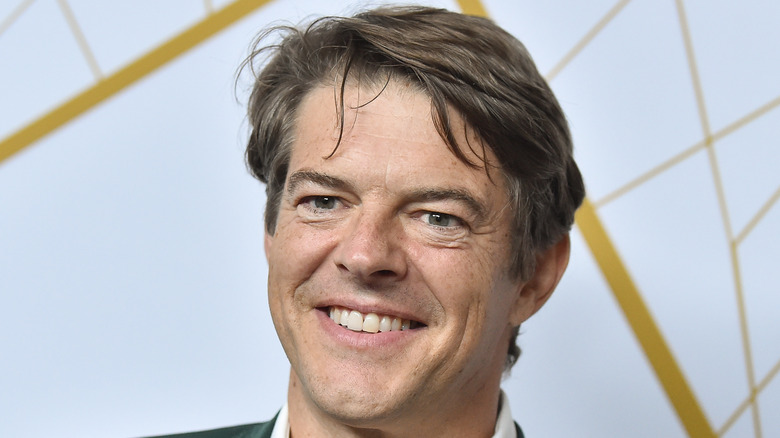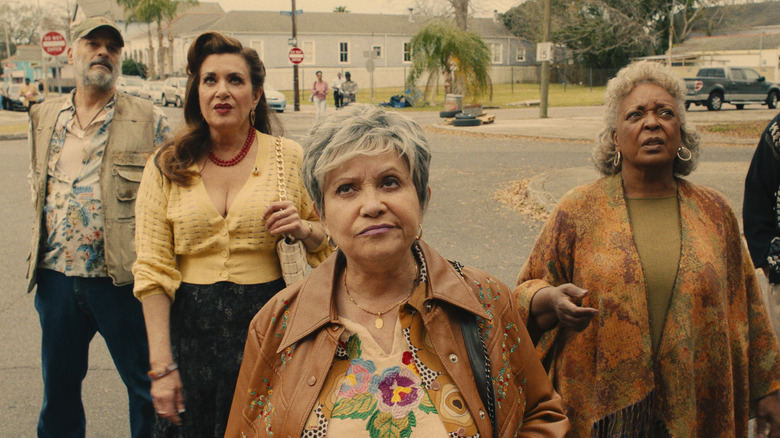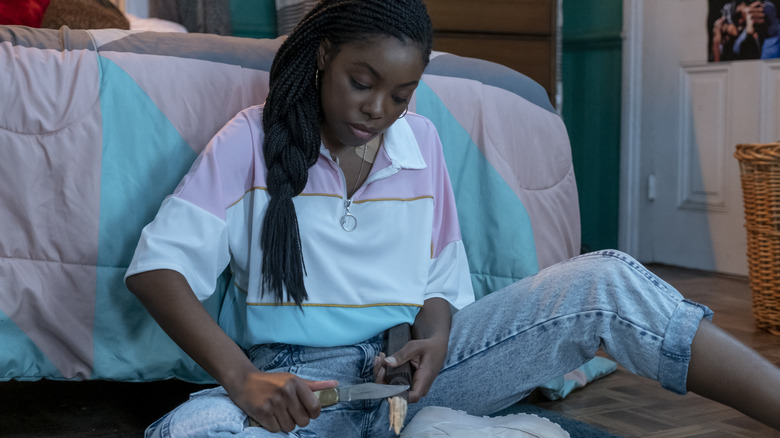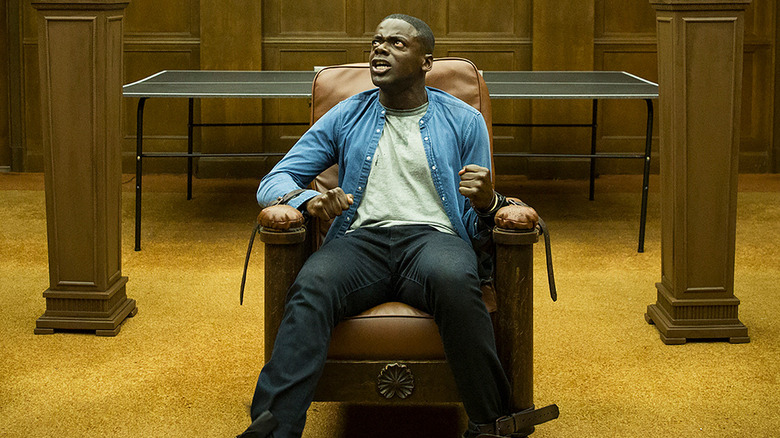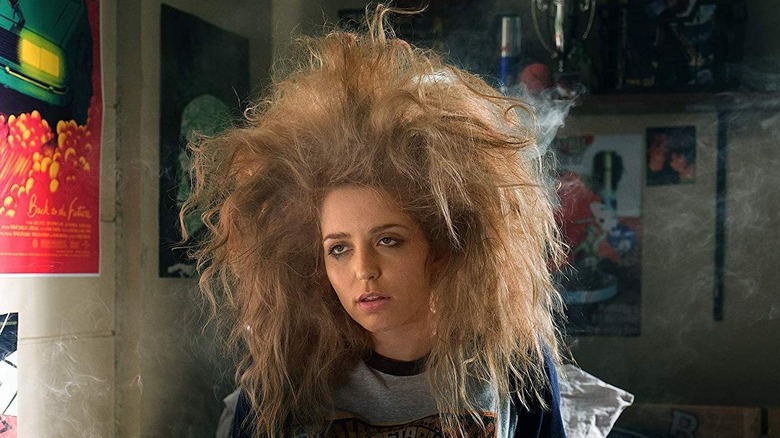Jason Blum Opens Up About Welcome To The Blumhouse, The Future Of Happy Death Day, And More - Exclusive Interview
In 2020, Amazon and Blumhouse Productions teamed up to bring audiences a series of films under the heading "Welcome to the Blumhouse." The films were described as having the unifying theme of "family and love as redemptive or destructive forces." One year later, the series is returning with four new films: "The Manor," "Bingo Hell," "Madres," and "Black as Night." The unifying theme this time is "institutional horrors and personal phobias."
Something that makes "Welcome to the Blumhouse" exceptional is that it features an interesting combination of experienced, veteran performers along with relative newcomers covering writing and directing duties. Like with all things at Blumhouse Productions, there is always the steady, executive producing hand of the man behind the company, Jason Blum. Looper had a chance to sit down with Blum to ask him about how he sees the evolution of this team-up with Amazon as well as what the legacy of Blumhouse itself has been over the course of the last decade. Why is it that they tell so many stories featuring older performers when other companies shy away from that direction? And perhaps most importantly of all, is there any update on the potential third chapter of the cult classic "Happy Death Day" series?
Welcome to the Blumhouse and casting older actors as leads
The first season of "Welcome to the Blumhouse" was "family and love as redemptive or destructive forces." And when the second season was announced, its theme was "institutional horrors and personal phobias." Other than the change in theme, how else did the ethos for this series evolve from series one to series two?
I think there's more connection between the topic of the movies and the choice we've made to pick directors from underrepresented groups of people. I think the four most recent movies are all about marginalized groups of people, and that wasn't really true of the first four movies. So I think we married more of the notion of how we chose the directors and the topics of the movies. We married those things better in the second series of four movies.
There were multiple stories that focused on older people, which I can be uncommon in horror. Why is it that we don't see more stories like that? And I think more importantly, why is it important that we get those stories?
Well, you don't see a lot of horror stories that feature older people, because people who make horror movies are very concerned about the audience being younger. They think the audience is dumb and is only interested in watching themselves. So we've had a lot of success putting older people in horror movies, such as Lin Shaye in the "Insidious" movies. There's one "Insidious" movie in particular where she stars, she is the whole movie. She stars in the movie. She's not a supporting part at all. We've had Jamie Lee Curtis, obviously, in three "Halloween" movies. And so I just don't believe that because they're people of a different generation in a movie, the other generation isn't going to watch them. And I've been right. So that's why when we saw these scripts, I think there are a lot of companies that say, "Well, this is a good movie, but you can't make a movie just starring an older woman in an old person's home, with only older people, except for her grandson," and we did it.
Madres and Black as Night
The movie "Madres" really jumps out because it hits that institutional horror thing so hard in a specific way. This is a specific story speaking to a specific reality. How important is it to you that the stories you're telling through Blumhouse shine a light on systemic injustice?
I think in this series, it was important because it would be weird if you had, if the authors of these stories ... we chose to make the authors from groups of people who don't have a chance at bat as often as they should. And so the stories they chose to tell are about people like that. Not in obviously entertainment, but in doing other things whose voice has been muted in some way. And so that was very important to me for this particular series. More generally speaking, the movies that we do, I think it's always interesting when a horror movie is super scary and then underneath it's about something. I don't mandate it, but I think we're more drawn to those movies because I think oftentimes they're more interesting.
One of the other movies in this series, "Black as Night," is this vampire story. And it wasn't that long ago that "Vampires in the Bronx" came out on Netflix. And "Midnight Mass" is even more recent. We've turned the page on a new evolution on what vampires are — what they represent in horror and when we're looking at our world. Do you think there's a reason why vampires have suddenly gotten so big recently in a fresh way?
The idea of a vampire can be a metaphor for so many things. Ten years ago, all the "Twilight" movies, obviously vampires were big then too. But they were tackling other things. But the notion of someone who's only up at night and feeds off other people, you can apply it to so many different social ills. It's just such a fantastic idea. So that's why I think it can be applied to so many different things. And I think it has just, to your point, I think it has been for years and will continue to be. And it's a genre that can, like you say, it can be reinvented or molded to shape particular things that are going on in the present world, whatever time that may be. And I think we'll continue to see that.
Guideposts for new filmmakers and the legacy of Blumhouse
You used the word "mandate" when we were talking about "Madres" and you're bringing in all of this younger, less experienced talent for "Welcome to the Blumhouse." And there is a shape, a direction that Blumhouse is always moving in. Are there guideposts that you have when you bring in younger talent, especially?
No. We really, I mean, I guess there are to a certain degree. I mean, obviously we want the movies ... Anyone would say this, we want them to be good. We want them to feel scary or unsettling or thrilling or unnerving. Those are all things that are important. And I think the other thing that's important to us in terms of goalposts is we want the movies to feel original and different. I don't pretend to suggest that we succeed at that every time out, but we try to make the work that we do feel different from things that have come before it. And I do think that for these four movies, that filter worked. I think these are certainly four very original movies. They're movies that don't feel like other movies one may have seen.
The 2018 "Halloween" really stands out, especially as an example of Blumhouse having a huge impact on the shape and direction of horror. Other than that, what do you think, especially just looking at the last 10 years, has been the big legacy coming out of Blumhouse so far?
I think "Get Out" was a pivotal movie for us and also for the horror business. I think "Get Out" made, I don't know if this is good or bad, but it made those of us who like horror movies and those of us who make horror movies more legitimate. It got recognized so much by the Academy. So I think suddenly filmmakers who never thought they would direct a horror movie got interested in horror. I think that was a pivotal movie for the horror community. I think "Paranormal Activity" started the big interest in supernatural horror, which, previous to "Paranormal," it was "Saw" and bloody and gory. And I think "Insidious" wouldn't exist without "Paranormal." "The Conjuring" wouldn't exist without "Insidious." So I think that was another trendsetting horse. In that case, a series of movies that we did. Those are a few.
Happy Death Day and disagreements over 2018's Halloween
Some of what you're talking about is arthouse horror. But something else about Blumhouse is that you'll also you'll produce something that's like "Truth or Dare," which is goofy and weird and has a dark ending. Wow, what an ending.
"Truth or Dare" was great. I loved that movie. Did you see "Freaky" with Vince Vaughn? That was a great movie.
"Freaky" is great. It's really hard not to ask in this moment, is there any chance of a third "Happy Death Day" movie? Has there been any more talk about that?
I will say it's not over yet. I have been hatching a plan. It's not fully baked, but I'm trying to figure something out.
Right as we were coming into this interview, my phone recommended an article about how a producer on the 2018 "Halloween" said that they fought against the Dr. Sartain twist. Candidly, do you think fans really need to know information like that? People know more and more about production these days, and I wonder whether you think that's good, bad, or just a fact of where we are.
I think in an ideal world, it's not good. I think in an ideal world, you want to just see these things in a vacuum and appreciate them like that. But we don't live in an ideal world. So it's not something that ... It doesn't keep me up at night, because it just happens. So — and I'm actually not — there are some directors or some producers who are like "You have to go into a bubble or into a cage to read my script." And I always think that's a little self-important.
"Bingo Hell" and "Black as Night" will debut on Amazon Prime Video on October 1. "Madres" and "The Manor" will be on Amazon Prime Video on October 8.
